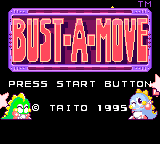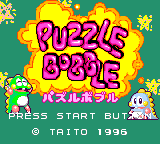Difference between revisions of "Bust-A-Move"
From Sega Retro
m (US publisher, refs) |
(expanded more on versus mode) |
||
| Line 24: | Line 24: | ||
}} | }} | ||
}} | }} | ||
| − | {{sub-stub}}'''''{{PAGENAME}}''''', known as '''''Puzzle Bobble''''' (パズルボブル) in Japan, is a puzzle game created by [[Taito]] as a spin-off to their popular ''[[Bubble Bobble]]'' series. Originally released in arcades, the ''Bust-A-Move'' was brought to the [[Sega Game Gear]] in 1996 by [[Santos]]. | + | {{sub-stub}}'''''{{PAGENAME}}''''', known as '''''Puzzle Bobble''''' (パズルボブル) in Japan, is a puzzle game created by [[Taito]] as a spin-off to their popular ''[[Bubble Bobble]]'' series. Originally released in arcades, the ''Bust-A-Move'' was brought to the [[Sega Game Gear]] in 1996 by [[Santos]]. It is the only portable port of the original game. |
It was the last third-party Game Gear game released in Japan and the only non-Sega game to use the [[Kid's Gear]] brand (the last Japanese GG game being ''[[G Sonic]]''). | It was the last third-party Game Gear game released in Japan and the only non-Sega game to use the [[Kid's Gear]] brand (the last Japanese GG game being ''[[G Sonic]]''). | ||
| Line 37: | Line 37: | ||
The game includes the 30 rounds from the original arcade game along with 70 new ones for a total of 100 rounds (including the final boss fight with Super Drunk). These are the same 100 rounds that are also available on the [[Super NES]] version of the game. The game has a password system so the player can continue from any level later. Additionally, there are three special new bubble types absent from the arcade game: the lightning bubble (shoots a bolt of lightning horizontally, breaking all bubbles in its path), the flame bubble (pops all bubbles in a radius around it), and the water bubble (releases a waterfall that paints all bubbles it touches the same color). | The game includes the 30 rounds from the original arcade game along with 70 new ones for a total of 100 rounds (including the final boss fight with Super Drunk). These are the same 100 rounds that are also available on the [[Super NES]] version of the game. The game has a password system so the player can continue from any level later. Additionally, there are three special new bubble types absent from the arcade game: the lightning bubble (shoots a bolt of lightning horizontally, breaking all bubbles in its path), the flame bubble (pops all bubbles in a radius around it), and the water bubble (releases a waterfall that paints all bubbles it touches the same color). | ||
| − | There is also a Versus Mode that can be played against the computer or against another person over a Gear-to-Gear Cable | + | There is also a Versus Mode and a Challenge Mode. The Versus Mode that can be played against the computer or against another person over a Gear-to-Gear Cable. In this mode, any bubbles hanging off the busted bubbles are dropped on your opponent's side. Against the computer, the player tries to win the best of three rounds against ten different computer opponents. Against a person, players can choose to play a single round or a best of three, five, or seven games. The Challenge Mode is an endless mode that continually feeds new lines of bubbles as the player eliminates them. |
==History== | ==History== | ||
Revision as of 11:53, 4 January 2022
| |||||||||||||||
| Bust-A-Move | |||||||||||||||
|---|---|---|---|---|---|---|---|---|---|---|---|---|---|---|---|
| System(s): Sega Game Gear | |||||||||||||||
| Publisher: Taito[1] (JP) Sega[1] (US) | |||||||||||||||
| Developer: Santos[1] | |||||||||||||||
| Peripherals supported: Gear-to-Gear Cable | |||||||||||||||
| Genre: Puzzle[2][3] | |||||||||||||||
| Number of players: 1-2 | |||||||||||||||
| |||||||||||||||
|
This teeny-tiny article needs some work. You can help us by expanding it.
Bust-A-Move, known as Puzzle Bobble (パズルボブル) in Japan, is a puzzle game created by Taito as a spin-off to their popular Bubble Bobble series. Originally released in arcades, the Bust-A-Move was brought to the Sega Game Gear in 1996 by Santos. It is the only portable port of the original game.
It was the last third-party Game Gear game released in Japan and the only non-Sega game to use the Kid's Gear brand (the last Japanese GG game being G Sonic).
A Sega Master System GG2SMS hack was released in April 2014.
Contents
Gameplay
The objective of the game is to clear all the bubbles from the arena without any bubble crossing the bottom line. To do so, Bub and Bob fire bubbles from the Bubble Launcher at the bottom. The Bubble Launcher is aimed with ![]() and
and ![]() and fired with
and fired with ![]() . The fired bubbles travel in straight lines (possibly bouncing off the sidewalls of the arena), stopping when they touch other bubbles or reach the top of the arena. If a bubble touches identically-colored bubbles, forming a group of three or more, those bubbles—as well as any bubbles hanging from them—are removed from the field of play and points are awarded. The color of bubbles fired is randomly generated and chosen from the colors of bubbles still left on the screen. Bubbles are fired automatically if the player is idle.
. The fired bubbles travel in straight lines (possibly bouncing off the sidewalls of the arena), stopping when they touch other bubbles or reach the top of the arena. If a bubble touches identically-colored bubbles, forming a group of three or more, those bubbles—as well as any bubbles hanging from them—are removed from the field of play and points are awarded. The color of bubbles fired is randomly generated and chosen from the colors of bubbles still left on the screen. Bubbles are fired automatically if the player is idle.
After every few shots, the ceiling of the playing arena drops downwards slightly, along with all the bubbles stuck to it. The screen shakes the turn before the ceiling drops as a warning to the player. The number of shots between each drop of the ceiling is influenced by the number of bubble colors remaining. The closer the bubbles get to the bottom of the screen, the faster the music plays, and if they cross the line at the bottom, the game is over. Because of this constraint, each round effectively must be completed within a certain number of moves. Most rounds are designed such that the player must be strategic and pop bubbles with longer chains of bubbles hanging from them in order to finish before the ceiling drops too low.
The game includes the 30 rounds from the original arcade game along with 70 new ones for a total of 100 rounds (including the final boss fight with Super Drunk). These are the same 100 rounds that are also available on the Super NES version of the game. The game has a password system so the player can continue from any level later. Additionally, there are three special new bubble types absent from the arcade game: the lightning bubble (shoots a bolt of lightning horizontally, breaking all bubbles in its path), the flame bubble (pops all bubbles in a radius around it), and the water bubble (releases a waterfall that paints all bubbles it touches the same color).
There is also a Versus Mode and a Challenge Mode. The Versus Mode that can be played against the computer or against another person over a Gear-to-Gear Cable. In this mode, any bubbles hanging off the busted bubbles are dropped on your opponent's side. Against the computer, the player tries to win the best of three rounds against ten different computer opponents. Against a person, players can choose to play a single round or a best of three, five, or seven games. The Challenge Mode is an endless mode that continually feeds new lines of bubbles as the player eliminates them.
History
Bust-A-Move's format has been extremely successful for Taito, moreso than the original Bubble Bobble or Rainbow Islands. As such, the Bust-A-Move series has seen numerous sequels (starting with Bust-A-Move 2: Arcade Edition) and several similar clones.
Versions
Localised names
| Language | Localised Name | English Translation |
|---|---|---|
| English (US) | Bust-A-Move | Bust-A-Move |
| Japanese | パズルボブル | Puzzle Bobble |
Production credits
- Director: Jin.
- Planner: Jin.
- Programmers: Arinko, Goripon
- Graphics Designers: Some1
- Sound by: Tama
- Manual Designer: Kazuo Nakagawa
- Special Thanks to: Shouji Takahashi, Yuji Koga, Midori Tokutomi, Yuichi Kanno, Satoru Tanabe
- Producers: Seizo Matsutaka, Takeo Shirasaka
- Executive Producer: Koichi Nakamura
Magazine articles
- Main article: Bust-A-Move/Magazine articles.
Physical scans
| Sega Retro Average | ||||||||||||||
|---|---|---|---|---|---|---|---|---|---|---|---|---|---|---|
|
| 69 | |
|---|---|
| Based on 2 reviews | |
Technical information
ROM dump status
| System | Hash | Size | Build Date | Source | Comments | |||||||||
|---|---|---|---|---|---|---|---|---|---|---|---|---|---|---|
| ? |
|
256kB | Cartridge (JP) | |||||||||||
| ? |
|
256kB | Cartridge (US/EU) |
External links
- Sega of America webpage: Game Gear
References
- ↑ 1.0 1.1 1.2 http://gdri.smspower.org/wiki/index.php/Santos_(2)
- ↑ File:Bustamove GG JP Box Front.jpg
- ↑ 3.0 3.1 http://sega.jp/fb/segahard/gg/soft_licensee.html (Wayback Machine: 2013-01-01 20:24)
- ↑ Famitsu, "1996-09-06" (JP; 1996-08-23), page 29
- ↑ VideoGames, "March 1996" (US; 1996-02-20), page 80
| Bust-A-Move | |
|---|---|
|
Main page | Comparisons | Maps | Hidden content | Magazine articles | Reception | |
| Bubble Bobble/Rainbow Islands games for Sega systems |
|---|
| Bubble Bobble (1988) | Rainbow Islands Extra (1990) | Rainbow Islands (1993) | Bubble Bobble also featuring Rainbow Islands (1996) | Bubble Symphony (1997) |
| Puzzle Bobble/Bust-a-Move games for Sega systems |
| Bust-A-Move (1996) | Bust-A-Move 2: Arcade Edition (1996) | Bust-A-Move 3 (1997) | Bust-A-Move 4 (2000) | Azumanga Daioh Puzzle Bobble (2002) |
| Unlicensed Bubble Bobble/Rainbow Islands games for Sega systems |
| Super Bubble Bobble MD (1995) |
- Gear-to-Gear Cable-compatible games
- 1-2 player games
- JP Game Gear games
- All JP games
- US Game Gear games
- All US games
- Game Gear games
- 1996 Game Gear games
- All 1996 games
- Game Gear puzzle games
- All puzzle games
- All games
- Sub-stubs
- Credits without source
- Credits without reference
- Old technical information
- Bust-A-Move
- Bubble Bobble (franchise)






